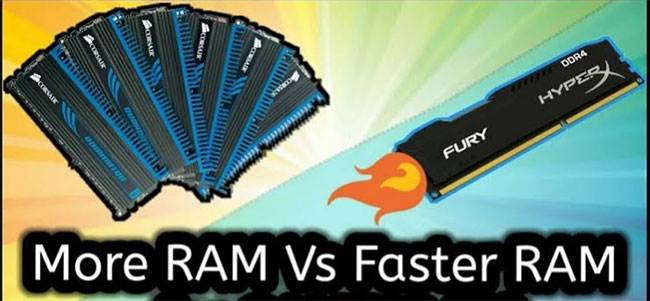Should change RAM faster or use more RAM?
You are encouraged to upgrade your existing computer instead of buying a new one, as this will both save money and cut down on electronic waste. But as usual, wanting to save money requires a bit of knowledge.
You've narrowed the source of your PC slowdown to RAM, but what are you going to do with it? Should you increase the amount of RAM or use it faster? This question is not as simple as you might think.
Difference between capacity and RAM speed

You can measure the amount of RAM in megabytes (MB), gigabytes (GB) or terabytes (TB). Increasing the amount of RAM reduces the need to use the hard drive for temporary files. But once you have enough RAM to meet your needs, you'll reach the point where adding more RAM isn't the best way to get the speed improvements you expect. You can benefit more by buying RAM that offers faster speeds than existing RAM.
There are several metrics that determine the speed of your RAM. Frequency affects the maximum bandwidth, which is the amount of data that can be transferred to and from RAM at a time. Latency affects how fast the RAM can respond to the request.
Frequency is measured in megahertz (MHz) and larger the better. Latency appears as a series of numbers (such as 5-5-5-12) and the lower the better.
When capacity needs are met, increasing frequency and reducing latency can give you a more noticeable result than adding more RAM.
How much RAM do you need or how fast is enough?
Having RAM is useful if you enjoy professional video or audio editing. However, even under those circumstances, 8 to 16GB of RAM is still enough to handle running a number of professional applications at the same time. You probably won't need to think about upgrading for a few years, if all is well.
If you're a gamer, you can get some benefits from having 16GB of RAM, but 8GB can still handle most games. Taking the leap to 32GB is currently unnecessary. At that point, it might be better to buy faster RAM.
No matter how you use your PC, speed is nothing if your motherboard isn't as fast as RAM. The 1333MHz motherboard will limit your 2000MHz RAM to 1333MHz.
There are many cases where you will need more RAM, but the chances of you encounter these situations are when you are managing a server.
How should you buy or upgrade RAM?

Are you trying to upgrade or start over? The first option comes with more restrictions.
To start, determine if your RAM has been soldered to the motherboard or not? In case that is true, you cannot upgrade. So sorry.
If the RAM is not dead soldered, see how many RAM slots does your machine have? This can determine how much RAM you can have. DDR2 reaches up to 4GB. DDR3 stick can be up to 8GB. You need two sticks of DDR3 RAM if you want 16GB RAM. Unless, the machine can handle 16GB DDR4.
If you only have one stick of RAM in your machine with 2 RAM slots, try adding a second stick instead of replacing your existing RAM stick. Dual channel platforms can offer a number of benefits depending on the type of problem your computer is facing.
If you plan to start over and are wondering between a single stick of 8GB RAM versus two 4GB stick, go for the 8GB. That gives you the option of adding a second bar to achieve 16GB in the future, instead of having to replace two existing bars. The difference between one and two sticks of RAM isn't so great that you may regret (or even notice) having chosen to install only one.
If you want to upgrade your RAM but don't have free slots left, the only option is to buy faster bars.